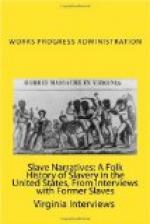So we begged, an’ we say, “Our missus is good. Don’t you kill her. Don’t you take our meat away from us. Don’t you hurt her. Don’t you burn her house down.” So they burned the stable and some of the other buildings, but they did not burn the house nor hurt us any. We saw the rest of the Yanks comin’. They never stopped for nothin’. Their horses would jump the worn rail fences and they come ’cross fields ’n everything. They bound our missus upstairs so she couldn’t get away, then they came to the sheds and we begged and begged for her. Then they loosed her, but they took some of us for refugees and some of the slaves went off with them of their own will. They took all the things that were buried all the hams and everything they wanted. But they did not burn the house and our missus was saved.
31. Did you know any Negroes who enlisted or joined the northern army? Yes.
32. Did you know any Negroes who enlisted in the southern army?
Yes.
33. Did your master join the confederacy? What do you remember of his return from the war? Or was he wounded and killed?
Yes. Two boys went. One was killed and one came back.
34. Did you live in Savannah when Sherman and the Northern forces marched through the state, and do you remember the excitement in your town or around the plantation where you lived?
We lived north of Savannah. I don’t know how far it was, but it was in South Carolina.
35. Did your master’s house get robbed or burned during the time of Sherman’s march?
We were robbed, but the house was not burned. We saved it for them.
36. What kind of uniforms did they wear during the civil war?
Blue and gray
37. What sort of medicine was used in the days just after the war? Describe a Negro doctor of that period.
She used to make tea out of the Devil’s Shoe String that grew along on the ground. We used oil and turpentine. Put turpentine on sores.
38. What do you remember about northern people or outside people moving into the community after the war?
Yes. Mrs. Dermont, she taught white folks. I didn’t go to school.
39. How did your family’s life compare after Emancipation with it before?
I had it better and so did the rest.
40. Do you know anything about political meetings and clubs formed after the war?
You had to have a ticket to go to church or the paddle rollers.
41. Do you know anything regarding the letters and stories from Negroes who migrated north after the war?
No.
42. Were there any Negroes of your acquaintance who were skilled [TR: illegible] particular line of work?
Yes. In making shoes and furniture, they had to do most everything well or get paddled.
FEDERAL WRITERS’ PROJECT American Guide, (Negro Writers’ Unit)




